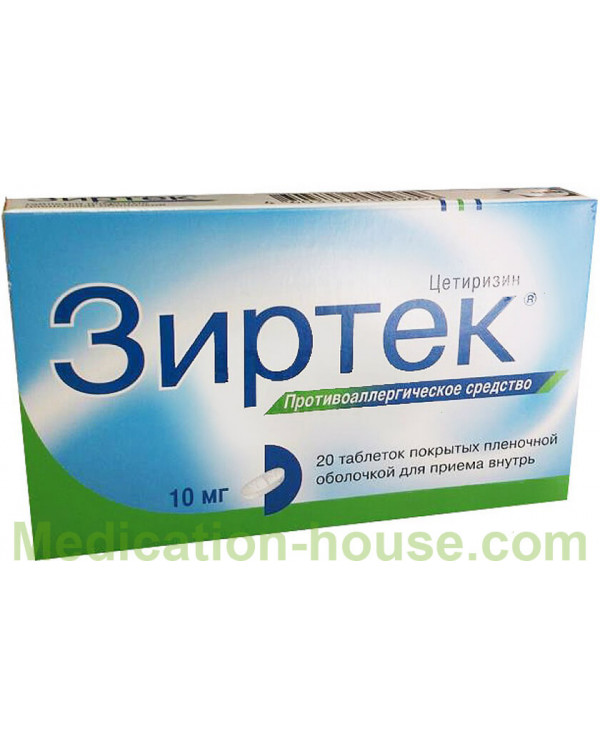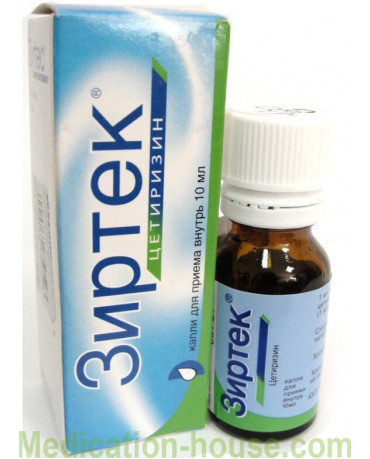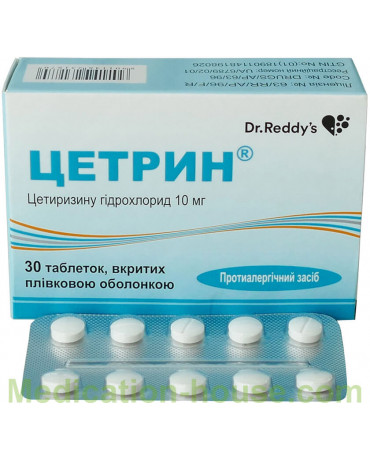Zyrtec instruction
You can buy Zyrtec here
Zyrtec - an antihistamine drug of the 2nd generation, has anti-allergic, antipruritic and anti-exudative action. The manufacturer of the drug is the Swiss pharmaceutical company UCB Farchim. Zyrtec is widely used to eliminate allergic reactions and prevent the recurrence of allergies in adults and children. Zyrtec has gained popularity as an effective and reliable drug that can fight allergic pathologies and prevent further progression of the disease.
Allergy - the scourge of modern society. High rhythm of life, constant stress, unhealthy diet, wide distribution of chemicals, environmental pollution - all these factors become provocateurs of allergic reactions. The insidiousness of the disease is that allergies may not manifest themselves for a long time by external symptoms. At the same time, inflammatory reactions continue to progress in the human body, supported by the supply of allergens from the external environment.
Over time, the severity of the pathology increases and can develop from mild food allergies to severe bronchial asthma or lead to other serious health problems. Prevent such complications and are designed to modern and effective drugs, one of which is Zyrtec. Let us consider in more detail what kind of therapeutic effect the drug has, from what Zyrtec helps and how to use it correctly.
Zyrtec - drug action
Zyrtec is antiallergic agent from the group of histamine blockers of the 2nd generation. Its therapeutic effect is the ability to block the production of histamine, which plays a major role in the development of allergic reactions and its main symptoms (skin rashes, itching, allergic rhinitis, conjunctivitis, tearing, swelling and redness of the skin).
In response to the penetration of allergens, the body begins to produce biologically active protective substances (histamine, serotonin), which are mediators of inflammation. The main active ingredient of the drug, cetirizine, prevents the release of large amounts of histamine and suppresses its action, due to which allergic reactions subside.
The drug has a pronounced antipruritic effect, prevents exudate secretion, reduces the permeability of the capillary walls, eliminates edema. In bronchial asthma, the drug prevents the development of bronchospasm.
The main active substance prevents the release of substances that provoke inflammation, stabilizes the state of cell membranes, eliminates smooth muscle spasm.
Allergens practically do not get used to the drug, even with prolonged use. Zyrtec in therapeutic doses does not have a sedative effect and does not cause adverse reactions from the cardiovascular system and other vital organs.
The therapeutic effect after a single dose of the initial dose of the drug comes after 20 minutes, and its effect lasts for a day. After ingestion, the drug is completely absorbed from the gastrointestinal tract and after 1 hour its maximum concentration in the plasma is noted. It is metabolized in small quantities in the liver, excreted mainly by the kidneys unchanged. After stopping the course of treatment, the therapeutic effect of the drug lasts for 3 days.
Composition and release form
Zyrtec produced in two varieties: tablets and drops for oral administration.
Zyrtec tablets in a film shell - an oblong form, white in color, have a one-sided risk and engraving "Y" on both sides. In 1 tablet of Zyrtec there is 10 mg of cetirizine + excipients. Tablets of 7 or 10 pieces are packed in blisters and cardboard packs.
Zyrtec tablets should be stored in the original packaging at a temperature not exceeding 30 ° C, the drops are stored at a temperature not exceeding 25 ° C. Shelf life of the drug - 5 years.
Indications for use
In medical practice, the drug is prescribed for the treatment of the following conditions:
Elimination of symptoms of chronic or seasonal allergic rhinitis, conjunctivitis, manifested by nasal congestion, runny nose, lacrimation, redness and swelling of the conjunctiva of the eyes.
Treatment of pollinosis (hay fever) and urticaria
Food and Drug Allergy Treatment
Treatment of allergic dermatoses (atopic dermatitis)
Zyrtec is effective in any allergic conditions caused by various allergens (pollen, animal hair, dust, household chemicals). The drug is used as first aid for allergic reactions to insect bites and severe complications, accompanied by angioedema and anaphylactic shock.
The drug is often prescribed as part of complex treatment for atopic asthma and obstructive bronchitis. The drug is so widely used due to the fact that, unlike the antihistamines of the 1st generation, it does not have such a pronounced inhibitory effect on the nervous system.
Instructions for use and dosage
The doctor determines the optimal dosage and treatment regimen on an individual basis, taking into account the severity of the disease, possible contraindications and the general condition of the patient. According to the instructions for use Zyrtec, children older than 6 years and adult patients are advised to prescribe the drug in the form of tablets. Adults need to take 1 tablet (10 mg) once a day. In children, a dose of 10 mg can be divided into two doses and take half a Zyrtec tablet (5 mg) in the morning and evening. In most cases, in children, an initial dose of 5 mg is sufficient to achieve a therapeutic effect.
Tablets should not be chewed, they must be swallowed whole, washed down with a small amount of water. If necessary, take a smaller dose, the tablet can be divided in half by risk. To achieve the maximum therapeutic effect, it is better to take the drug 1 hour before meals or one hour after meals.
With a single use it is better to drink the drug in the evening, since it is at this time that the greatest release of histamine occurs. If a doctor prescribes to take the drug twice a day, then it is best to do it in the morning and in the evening, observing the 12 hour interval between doses.
If long-term course therapy with Zyrtec is needed, then doctors try to prescribe a minimum dose of the drug, which is enough to achieve a therapeutic effect.
So, if the daily dose of 5 mg allows you to prevent the manifestations of allergies, then it should not be increased. In elderly patients and those suffering from disorders of the liver and kidneys, the dosage of the drug should be adjusted depending on the condition and the treatment should be carried out under medical supervision.
How much can you give Zyrtec? For acute allergic reactions, the medicine must be taken until the symptoms disappear. On average, the course of treatment takes from 7 to 10 days. If the patient suffers from seasonal or year-round allergies, the course of treatment is longer - from 20 to 28 days, with intervals of 2-3 weeks between them.
Overdose
In case of drug overdose, the following symptoms occur: headache, dizziness, dry mouth, weakness, drowsiness, confusion.
The patient may fall into a stupor or, on the contrary, become overly irritable, he has tremor, urinary retention, symptoms of tachycardia, itchy skin, low blood pressure. In such cases, the patient is given a gastric lavage, enterosorbents are prescribed, and symptomatic therapy is performed.
Zyrtec during pregnancy
Zyrtec during pregnancy is contraindicated. The active substance of the drug easily penetrates the placental barrier and may adversely affect the development of the fetus.
You can not take Zyrtec during breastfeeding, as cetirizine is excreted in breast milk, it has a depressing effect on the nervous system of the infant and may even cause respiratory arrest. If you need to use the drug during lactation, breastfeeding for a while stop, the child is transferred to artificial mixtures.
Contraindications
The drug is contraindicated for use in the following cases:
With increased sensitivity to components
With hereditary intolerance to galactose or lactase deficiency
During pregnancy and lactation
In end-stage renal disease
When hypersensitivity to hydroxyzine
The drug in drops can not be prescribed to children under 6 months of age, in the form of tablets can not be used in children under 6 years
With special care, Zyrtec should be prescribed for chronic liver diseases, renal failure, and age-related patients.
Side effects
The use of Zyrtec can cause undesirable side reactions from various organs and systems:
The central nervous system can respond to taking the drug with various disorders: headache, dizziness, increased fatigue, weakness, drowsiness. Patients may experience a decrease in blood pressure, fainting, impaired memory, the development of tremor, taste perversion, convulsions.
On the part of the gastrointestinal tract, patients note dry mouth, nausea, diarrhea, abdominal pain.
Sometimes there are mental disorders. The patient can be in a depressed or opposite, excited and aggressive state. Sleep disturbances, confusion, hallucinations, suicidal feelings and the development of depression are possible.
On the part of the cardiovascular system, symptoms of tachycardia occur, on the part of the blood-forming organs, undesirable changes in blood parameters are possible.
On the part of the senses, patients complain of blurred vision, dizziness associated with dysfunction of the vestibular apparatus is noted.
The respiratory system can respond to Zyrtec with symptoms of pharyngitis and rhinitis.
On the part of the urinary system, there is a disorder of urination, urinary retention or enuresis.
Possible metabolic disorders, weight gain, swelling, increased appetite.
The immune system reacts with hypersensitivity reactions, there may be a violation of the skin (rash, erythema, pruritus). In severe cases, there is a risk of developing anaphylactic shock.
To avoid the appearance of undesirable side effects, take the drug should only be prescribed by a doctor, strictly adhering to the dosage and frequency of use. If an adverse reaction occurs, treatment should be stopped and consult a specialist to adjust the subsequent course of therapy.
Drug interactions
While taking Zyrtec with antibiotics, pseudoephedrine, diazepam, no undesirable interaction was detected. During the period of drug treatment, it is necessary to abandon the use of alcohol, since the risk of inhibition of the central nervous system significantly increases.
With simultaneous use with ketoconazole and macrolides, numerous clinical studies of changes in the ECG (electrocardiogram) did not reveal.
special instructions
Children aged 6 months to 6 years old Zyrtec is prescribed only in drip form. For infants up to 6 months, any dosage form of the drug is contraindicated for use. Zyrtec has a minimal sedative effect; nevertheless, during drug therapy, one should be especially careful in handling vehicles and refraining from work that requires heightened concentration and psychomotor speed.
The drug should be prescribed with caution in chronic renal failure and elderly patients. In such cases, an individual adjustment of the dosage and regimen is required, the course of therapy should be carried out under the supervision of a physician.
Application Reviews
Review number 1
For the third consecutive year, I suffer from pollinosis. In the spring, in the period of flowering of plants, my torment begins. They suffer from allergic rhinitis, their eyes become swollen, itchy and watery, their nose is constantly blocked, some unpleasant dry cough and endless sneezing appear. Tried different drugs, but opted for Zyrtec.
Before him, she took Suprastin, but after taking the pills was sluggish and inhibited, her head did not work at all, constantly wanted to sleep. There are no such problems with Zyrtec, besides, you need to take the drug only once a day. I usually drink a pill for the night, I feel very good in the morning, but in the evening the allergic manifestations usually increase. We have to take the drug for about 2 weeks, until my plants are fading - allergens. But with Zyrtec, this period is much easier.
Review number 2
The daughter has food allergies, she is only 4 years old and she does not understand why many tasty things are forbidden for her to eat. Sometimes it can drag away an orange or slowly eat a chocolate bar. As a result, a rash appears immediately, the cheeks turn red, the skin itches and itches, the baby is naughty, not sleeping, and often cries. The doctor prescribed her an antiallergic drug Zyrtec in drops.
She was afraid that the child would refuse to take them, but the baby drinks them easily, since the solution has a sweetish, rather pleasant taste. We strictly observe the dosage, give the drug only 2 times a day, the result from the treatment is good. If an allergic reaction occurs, then after taking the drops for 3 days, all unpleasant symptoms usually disappear.
And Zyrtec very much helped out in an unusual situation. At the dacha, the little girl was stung by a bee, her face reddened before her eyes, the child began to choke, and before the ambulance arrived they gave Zyrtec drops to drink and soon she felt better. The doctors said that they did everything right, otherwise anaphylactic shock could be dangerous for life.
Terms of sell
You can buy Zyrtec without a prescription.






